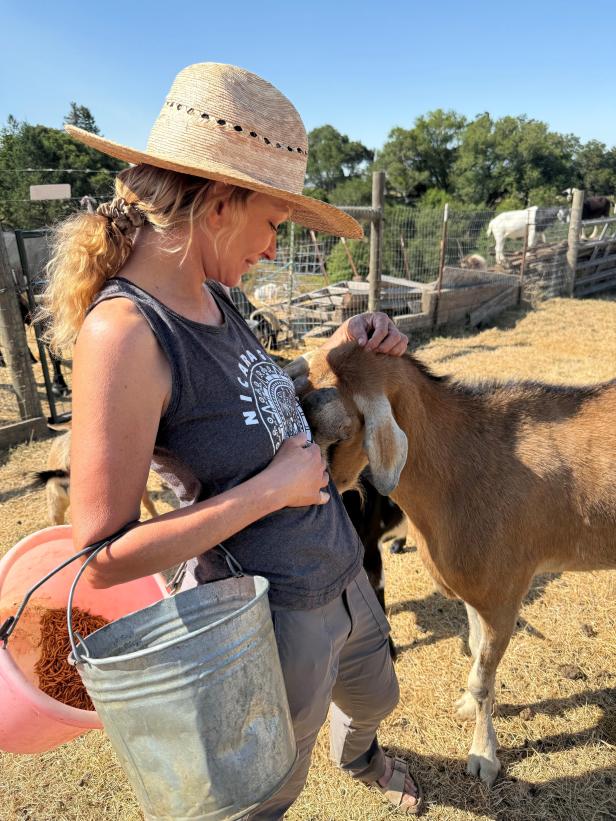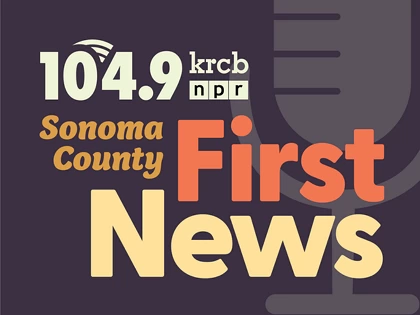 photo credit: Noah Abrams/KRCB
photo credit: Noah Abrams/KRCBNichola Schmitz with one of her goats, named Paul, at her animal sanctuary,
and home on Sonoma Mountain.
South of San Diego and north of the Golden Gate, fights over drone surveillance are playing out in court.
In Sonoma County, a lawsuit is calling into question the allegedly invasive practices of Permit Sonoma, the county's code enforcement agency.
One of the plaintiffs in that case is Nichola Schmitz.
It's easy to enjoy the morning sun at her home, high on the Sonoma Mountain slopes.
Schmitz, who is deaf, shares the small hillside ranch and it's panoramic views of the Santa Rosa Plain with rescued and disabled farm animals; but the property has lost some of its serenity in recent months.
The problem, Schmitz said via her sign language interpreter Anna Mindess, comes from the skies above.
"I was standing on the balcony that's right up there, and from there I saw this huge drone...right in the middle of my property," Schmitz said via Mindess. "This is a private zone, and it was flying really low, like, you know a helicopter or plane would be up high, but this was very low, and it could see details...it could see everything."
Schmitz is one of three plaintiffs in a lawsuit filed by the ACLU of Northern California against Permit Sonoma over its warrant-less use of drones to surveil for code violations.
"It's like they open the door...to my private property, they open the gate and invited themselves in," Schmitz said.
Shilpi Agarwal said that's a problem.
"The level and height and invasiveness of the particular drones that Sonoma County was using was something far beyond what we had seen before," Agarwal said.
Agarwal is one of the ACLU attorneys on the case against Permit Sonoma.
"Drones have typically been justified by the need to police un-permitted marijuana grows and that just can't sort of suffice as the justification when we see that the drones are largely being used in sort of urban areas," Agarwal said.
While not exactly an urban area - the Schmitz' property is a sanctuary for goats, chickens, and one very loudmouthed cow - the violations flagged by Permit Sonoma's drone flight over her home had nothing to do with cannabis, Schmitz said.
"You know the [Nuns] fire? That damaged a lot of my property, this slope here," Schmitz said via her interpreter Mindess. "There used to be lots of trees there, but they were all gone and then there was an erosion problem after all the rain. So, I had to add some dirt to stabilize the hillside, and that's when the drone came."
Permit Sonoma's drone program started in 2019, and overwhelmingly targeted issues with cannabis cultivation, but violations issued for zoning, building, and construction without a permit have ticked up over the past two years.
In 2024, non-cannabis-related drone flights accounted for 53 of the 115 surveillance flights.
The mission creep isn't a big surprise for Hannah Zhao.
"There will always be folks who find more justification to use it for other purposes and it expands its original directive," Zhao said. "That's really problematic. It is a sort of a natural thing to do because agencies are spending money on this equipment, right? They need to justify why they spent that money. So they need to continue finding new uses for it."
Zhao is an attorney at the Electronic Frontier Foundation, focusing on criminal justice, privacy, and cybersecurity issues.
"The amount of training you need to get a license to operate a drone is just a tiny fraction of what is needed to become...an aircraft pilot," Zhao said. "So these are the ways in which….technology is making it easier and easier for law enforcement, for the government to be encroaching on our privacy rights, and that's why we have to be super vigilant about it."
In addition to mission creep, Zhao said drones can gain intimate, and in some ways covert access to private property.
"They can get into areas where helicopters could never do, and that includes under the awnings and eaves of houses," Zhao said "They might be intentionally or unintentionally taking photos...of the inside of houses because they are at angles that can see into windows in a way that manned aircraft because of their size, because of their lack of agility and maneuverability just could never get into."
Schmitz and the other two plaintiffs at the heart of the ACLU's case against Permit Sonoma said, in the case filing, that they're motivated to take action because of that level of intrusiveness.
"I don't feel that sense of blind comfort anymore," Schmitz said. "I close all my drapes. I close my blinds. Everything used to be open before I would walk around in my robe. Sit on the deck, but now I'm always looking and watching. Is somebody watching me? I don't feel relaxed anymore."
Permit Sonoma did issue code violations to Schmitz for the work she said had to be done to immediately shore up the hillside on her property. The other plaintiffs in the ACLU case each had code violations on their properties as well.
Still, ACLU attorney Shilpi Agarwal said, "it's abundantly clear that the kind of surveillance and spying that Sonoma County is engaged in, in areas immediately outside the home is illegal."
Schmitz said the whole ordeal has strained her relationship with her neighbors, who she initially believed were operating the drone.
She also said it cost her over $16,000 to try and remedy the alleged code violations, a process she said has been complicated by a lack of accommodations from the county for sign language interpretation.
Agarwal said in the specific case, the ACLU is seeking, "an order from the court that essentially says drones cannot continue to be used in the manner that they have been used by Sonoma County unless they get a warrant."
Schmitz said she sees the lawsuit as not only important for her own personal privacy, but for the public's as well.
"We need to have some kind of watchdog and some kind of law that stops just wanton use of technology to invade people's privacy," Schmitz said, speaking via her sign language interpreter Anna Mindess. "If people didn't protest, they could just run all over us with this technology. It's a scary time."
The ACLU's case challenges Permit Sonoma's drone program on California state law, not federal civil rights violations.
Permit Sonoma Director Tennis Wick, one of the defendants named in the suit, has since announced his retirement. Other top code enforcement officials at the agency are listed as defendants in the case.
The next case hearing is scheduled for mid-October.

 Live Radio
Live Radio




